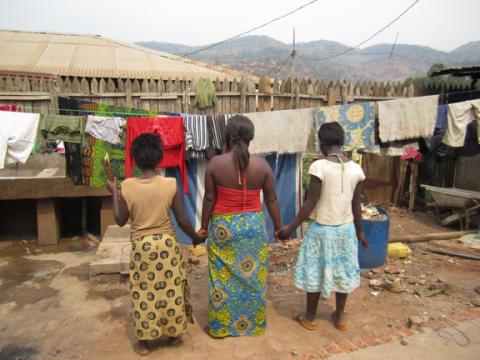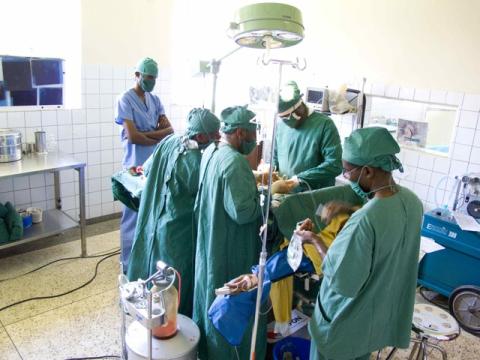
Sexual violence is rampant in eastern Democratic Republic of Congo (DRC). The UN estimates that over 200,000 women and girls have been raped since 1998, but the true extent is not known. Missing from these figures are women and girls held as sex slaves or forced wives and men who are also victimized. The world has never known such extreme levels of sexual violence. Yet this crisis is largely ignored by the global community.
Two aid organizations, The Stephen Lewis Foundation (SLF) of Canada and Panzi Foundation USA (PFUSA) are working to change that. Both groups have joined forces with Panzi Hospital and Dr. Denis Mukwege in Bukavu, DRC to provide life-saving treatment and empowerment programs for women and girls.
SLF’s initiatives focus on HIV testing and care, psychosocial support, economic recovery via income-generating activities for the women, and educational support for the schoolchildren of rape survivors.
“We absolutely had to expand our funding into Congo because the violence was so egregious and because the intersection between HIV/AIDS and sexual-based violence was so desperate and important,” SLF executive director Ilana Landsberg-Lewis told www.samaritanmag.com when asked why the Foundation established programs in the DRC.
The SLF does not rely on government and corporate funding or donations. Rather, most of the money raised to support their programs in the DRC comes from Canadian grassroots organizations and individuals.
PFUSA, co-founded by Dr. Mukwege, supports programs at the hospital, including Maison Dorcas, an after-care facility, safe house, and empowerment centre for women and children with programs for literacy, trauma recovery, skills training, legal assistance, housing, and community reintegration.
Dr. Mukwege, Panzi Hospital’s medical director and chief surgeon told www.samaritanmag.com, “When they come to the hospital, the biggest question is whether or not they [the women] will recover physically — the first step in bringing women back to life. Even when we treat the physical, there is still the trauma.

The causes of rampant sexual violence in the eastern DRC are complex. Simply put, the DRC is a failed state and unable to protect its citizens. The result is a myriad of armed groups that terrorize local populations, using rape as a weapon, with complete impunity for their crimes. Control over the DRC’s vast mineral resources, government corruption, long-standing land disputes between rival ethnic groups, citizenship rights, displaced populations, and the 1994 Rwanda genocide are but some of the issues that drive the conflict.
Interviews conducted with 30 rape survivors in 2009 by Dr. Lee Ann De Reus, an academic and co-founder of Panzi Foundation USA, confirmed previous reports that most women were attacked by members of the FDLR (Democratic Forces for the Liberation of Rwanda or Interahamwe). These individuals are mostly former members of the Hutu militias and Rwandan armed forces responsible for the 1994 genocide. Other reported perpetrators were members of the FARDC or the government army – the very forces expected to protect the citizenry.
Attacks typically occurred in a woman’s home or while she was out working in the field. Sometimes the women were ambushed on the way to market. The number of perpetrators ranged from one to 18 and the length of time a woman was held ranged from hours to two years. Some women were tortured. All spoke of the difficulties brought by the fighting in Congo. The fear of rape kept them from work in their fields, which in turn contributed to food insecurity. The destruction of homes caused displacement and a loss of livelihood. The murder of family members as well as their own attacks left the women emotionally devastated and without additional sources of income.
Panzi Hospital receives over 2,000 women each year in need of gynecological services due to rape. Many of the symptoms reported by women were the consequence of sexually transmitted and urinary infections or internal injury. Over one third of the women were seeking help for incontinence due to a “fistula” — or internal rupture. These injuries are due to violent rape with the use of an object – gun barrels or sticks, for example, which perforate the vagina and other organs. The surgery is difficult to perform and often women must have repeat surgeries to end their incontinence.
For many women, the psychological scars from sexual violence are regarded as worse than the physical injuries. The social stigma associated with rape and fistula leads to the frequent public humiliation and abandonment of women by husbands, families, and villages. A violated woman is considered “damaged.”
When asked about their hopes for themselves and their children, the women typically focused on their offspring, according to De Reus. They hoped their children would be provided for and that they would be able to attend school, she reports. When pressed about hope for themselves, they wished for good health so they could provide for their families. When asked if they considered themselves victims or survivors, virtually all chose the label of survivor.
In a single word, the women interviewed expressed their hope for women of Congo as a desire for “peace.” This sentiment was further reflected in their responses to the final interview question, “If you could send a message to people all over the world, what would you tell them?”
“I would ask them to pray for us,” said one woman. “But also to do what they can so that peace can be restored. Peace is beyond all kind of aid they can send. Because whatever aid they send, if there is no peace what will you be eating then? It is better that you eat vegetables having it salt or not, oil or not, when you know that you are quiet, you eat, you go in your bed, you sleep. These little children can be sent to school, old women can taken care, and men can go to job. This is the good thing I could ask people.”
The woman completed her interview by saying, “I could ask you to go and tell other people.”
The women interviewed at Panzi Hospital want peace so they can resume their daily lives free from sexual violence.
According to Dr. Mukwege, they can’t do it alone. “There is still a lot of hope for Congo. We need to get more people like Stephen Lewis who truly understand what needs to be done, to get more people to know about the reality, not just about the bad things, not just about what is going wrong. We have to stop treating the consequences and tackle the root causes and if we can do that, then we have the possibility to become a country of hope.”
Darcy Ataman is the founder of Song for Africa, is a music and film producer and Research Associate at the Global College.
Air Max